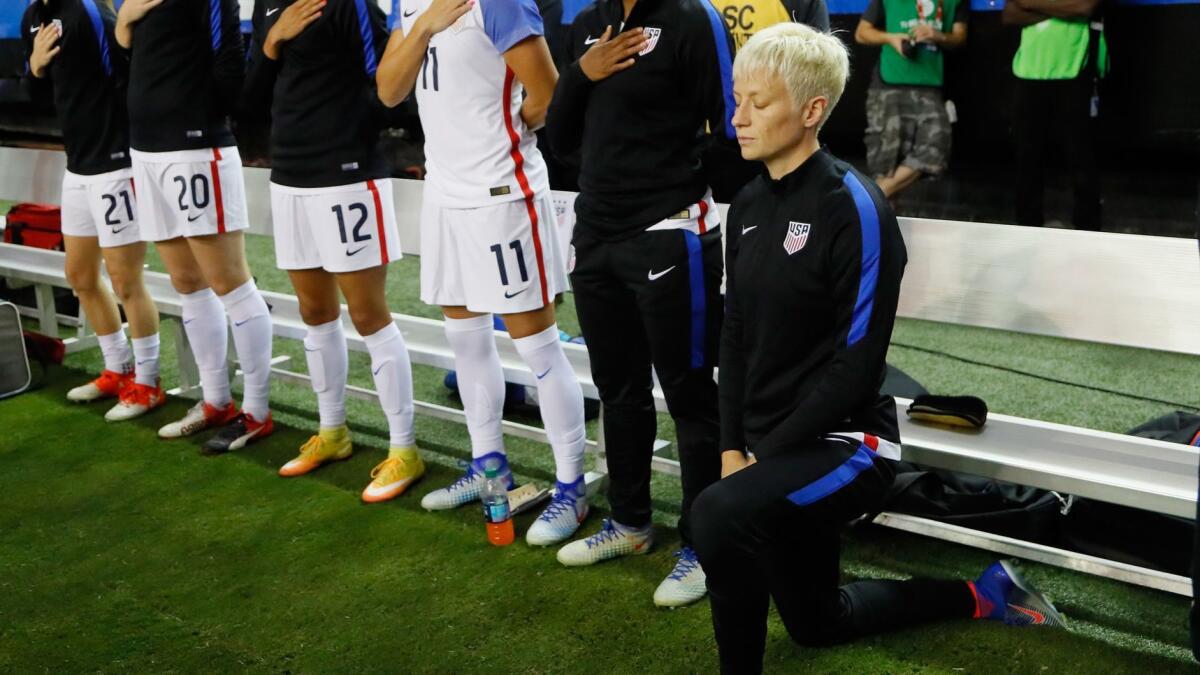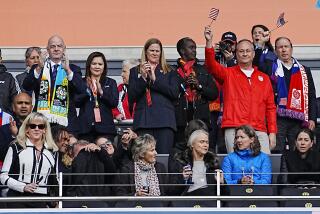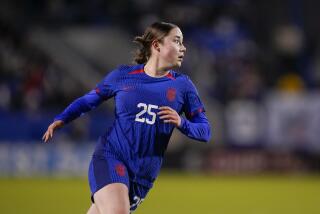Column: Megan Rapinoe making good use of her platform as U.S. soccer star

Megan Rapinoe has taken a stand for gender equality and taken a knee against racism. She’s spoken out for social change, spoken up for at-risk kids and spoken in favor of same-sex marriage.
What she can’t do, though, is stay quiet or seated if there’s an issue that needs to be addressed or a cause that must be championed.
So she pledges part of her salary to Common Goal, which supports soccer-centered charities around the world. She works with the ACLU, has partnered with the Seattle-area Boys and Girls Clubs and is an ambassador for Athlete Ally, which opposes homophobia in sports.
“I think that’s it, off the top of my head,” she says.
Not even close. Her latest campaign, the one she didn’t mention, might be her most successful yet. In less than two weeks Rapinoe has collected more than $150,000 for victims of the recent Carr fire, which ravaged her hometown of Redding.
Few of us do so much community work we have trouble remembering it all. But Rapinoe, a star forward for the U.S. women’s national soccer team, uses the fingers on both hands and still can’t keep track.
“My personal ethos is that everybody has a responsibility to try to make the world the best place it can be,” she says. “If you’re a lawyer, maybe you donate some of your time. If you’re a journalist, you’re writing a story that needs to be written.
“I have this incredible platform. I’ve been very lucky to be on one of the most recognizable teams and to have this huge following. To not use that, to not give back, that’s selfish. And I don’t feel right about that.”
Rapinoe isn’t the only athlete who has come to that conclusion. Former NFL quarterback Colin Kaepernick eventually lost his job — but inspired a movement — after he began kneeling during the national anthem to protest racial injustice. Houston Texans lineman J.J. Watt collected more than $41 million for victims of Hurricane Harvey last year. Several major league players, including the Dodgers’ Enrique Hernandez, raised both consciousness and material support after Hurricane Maria devastated Puerto Rico, killing nearly 3,000 people.
The Lakers’ LeBron James even built a school. Yet when he spoke up on social issues, Fox News commentator Laura Ingraham told him to “shut up and dribble.”
Rapinoe, who has also been told to leave her opinions in the locker room, finds that insulting.
“People call on athletes to be good role models and send the right message to kids,” she said. “If you’re going to ask athletes to be a role model, you can’t then be upset when they’re role models. You can’t be upset when they speak out for what they feel is right.”
Rapinoe, 33, has certainly been a role model on the field, overcoming three knee injuries to play in two World Cups and two Olympics, winning one of each. This year, for the second time, she made the shortlist for FIFA’s woman’s player of the year.
She learned her soccer the same place she learned her philanthropy: at home.
Her father Jim coached Rapinoe and her twin sister Rachael — who played professionally in Iceland and with the U.S. U-23 national team — in Redding, where Rapinoe excelled in three sports and made the honor roll all eight semesters at Foothill High.
“This is just how our family is,” Rapinoe said of her parents. “If we can help, we’re there. My [political] views are probably quite different from my family. But really, at the heart of everything, I’m very much a chip off the old block.”
Rapinoe also found common cause in the legacy of the women’s national team. Six months after winning the 1999 World Cup, Mia Hamm, Julie Foudy and Briana Scurry went on strike for better pay. That’s a cause Rapinoe and four teammates took up when they filed a federal complaint against U.S. Soccer eight months after winning their own World Cup in 2015.
The women eventually won, getting a 30% pay increase and better bonuses.
“Those players always stood up for what they felt was right,” Rapinoe said. “It’s kind of just in the DNA.”
It’s certainly in Rapinoe’s DNA, which is why she wanted to help her parents’ neighbors after the Carr fire ravaged Shasta County, causing an estimated $1.5 billion in damages, scorching 229,651 acres, destroying nearly 1,079 homes and forcing almost half of Redding’s 90,000 residents to evacuate.
Eight people died, including two children and one firefighter.
Members of the U.S. national team were among the first to donate, with former teammate Lauren Holiday and her husband Jrue sending $25,000, Rapinoe said.
“We all kind of find our causes that we are passionate about. But we’re also incredibly supportive of each other,” said Alex Morgan, who also wrote a check.
U.S. Soccer is helping too. During Friday’s game with Chile at StubHub Center, announcements on the scoreboard and over the PA system urged fans to give to the Shasta Regional Community Foundation. The federation — and many teammates — have also used social-media platforms to support the campaign (donations can be made at ussoccer.com/CarrFund).
“It’s pretty incredible to see the support,” Rapinoe said. “It’s humbling.”
It’s also proof that sometimes standing up rather than standing by can make a difference.
[email protected] | Twitter: @kbaxter11







